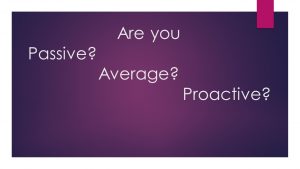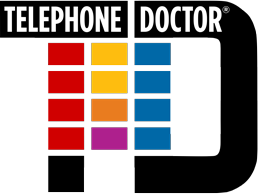IMPORTANT: None are bad. Each has many benefits to a company.
Fact: Often the reason there is trouble with customers is one of these personalities was placed in the wrong position.
Let’s go over the good, the bad and the ugly. Again, please remember, none of these are bad and everyone is one of them.
You can usually tell which category (Passive, Average or Proactive) you fall into – many times by how you greet someone. Certainly, how you work your sales presentation and after the sale skills. Sales can be lost (and won) in any of the 3 categories.
Let’s examine each of the categories from passive to proactive. Then at the end you decide which you are and how each team member falls into a category.
PASSIVE

The Passive individual is someone who receives information and does little, or nothing, with it.
Example: It can happen when we are shopping. We buy items – sometimes a lot; sometimes a little. We have spent money with the company. Sadly, the person at the counter rings up your sale and there has been no conversation; there’s been little, if any, eye contact. It just gets “done.” Perhaps if you’re fortunate enough you get a mumbled “have a nice day” and sometimes that’s said to the floor and not you personally.
We then give them a credit card with our name on it. They take the credit card and process whatever it is they need to do. Then they give us back the credit card.
They have yet to say our name.
They have said very little. And in all probability didn’t make any eye contact. The job got done, yes; however, they are extremely passive.
They had our name as it was on the credit card, yet they never used it.
That’s passive. It is not bad or wrong to be passive. It is, however, very disappointing to the customer. Placing a passive employee where a proactive person is needed makes a poor image on your company. There is nothing wrong with being passive; however, they normally belong in a different job position than a frontline one. They don’t belong in an area where first impressions are so very critical, necessary, and important. Frontline employees are judged and watched closely.
So where should passive individuals work? Normally passive employees prefer to be in an area by themselves. It’s not that passive people don’t like other people. They do like them. They just don’t intermingle with them as well as the average and proactive people do. They are not as comfortable with others as the others are with other people.
Another example. We check into a hotel and give our name to the counter person. You tell them you have a reservation for tonight or whatever number of nights you need. Sometimes they nod and find your reservation without saying a word. Then they give you all the forms to sign. They thank you and then you get your key. They are done. There is very little interaction with a passive person. Some say passive people feel as though they’re being pushy by offering information and things you might not need or want.
Again, passive people are not bad, they just should not be in a position where you are looking to have your customers welcomed with open arms. Passive salespeople often forget to carry business cards.
AVERAGE
As you might imagine, there are more average individuals around than passive or proactive.
Average folks honestly, really try. They just normally miss the mark, not by a lot, only a little. But the mark has been missed. They know they should do something more, but unfortunately, never figure out exactly what it is they should be doing.
Average people can take it up to a certain point and then it stops – down it goes. So, it appears “average” rules. That does not make it right.
It appears most of us struggle when we are dealing with an average individual. We’re disappointed because so often we feel that something will finally get handled right. But it never quite makes it.
That’s average. Giving average customer service, unfortunately, is what most of us end up dealing with. The service was just “okay.” Well, I don’t know about you, but I decided a long time ago that I did not want to be average. I wanted to be better than average.
It is much easier to get an average person up to being proactive rather than to get a passive person up to be average.
Working on the phones or in person on the frontline or a salesperson is not where a passive individual should be, we agree on that.
Putting someone average in those positions is just ‘okay.’ You now get to decide if that’s what you want – to be just “okay.” If you’re happy with being ‘average,’ no need to read on.
PROACTIVE
This is where and when customer service becomes the “island of excellence in an ocean of mediocrity.” Proactive individuals thrive on other people. Proactive folks stick their hand out first to shake yours. They greet you with a smile – a sincere smile – that makes you feel special.
Proactive people think ahead of the situation and out of the box. They’re usually fast thinkers and they ask questions. A lot of questions.
Proactive individuals are what we call “naturally inquisitive.” They’re always thinking – – thinking of what they can ask next. What can I learn? How can I help? What can I do?
Being naturally inquisitive is a large part of being proactive. A proactive person would not let a customer go ahead with something if the proactive person knew there was a better option for the customer.
Understand that proactive people are not necessarily any better than the other two categories, it’s just that they have the unique ability of being naturally inquisitive.
When given a job or an order or something to do, they don’t just say “okay” when they feel there’s something better for the customer or if there’s another way it could be done better or perhaps when they know it’s wrong. Proactive people can and do often save the day.
Again, proactive people are not better, they just fit into positions a bit better. And they enjoy that arena. Proactive people would probably cringe to be left with a job where there aren’t any people to talk with, interact with, or to ask questions.
Proactive individuals seldom tire of asking good questions. They will dig deeper into a situation to find a solution.
So, ASK YOURSELF: Which are you? Passive, average or proactive?
Whichever you are, remember, all these categories can serve the public in some positive way.
The passive individual may do it from the back room, not needing the limelight or attention. They enjoy working alone and managing their time by themselves.
The average person usually would love to know how to be proactive and with a little TLC and some additional training on how to become proactive, it can be done.
The proactive person is the one the public, the consumer, wants to work with and feels comfortable with. The customer will go out of their way to look for a proactive individual to help them.
Whichever you are, be the best of whatever you are.
